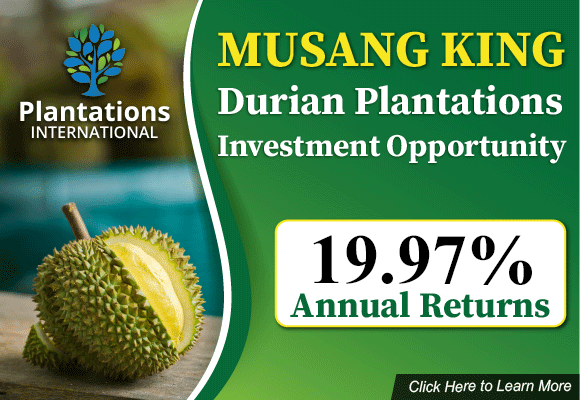Malaysian durian farmers will be able to export fresh durians instead of frozen fruit to China starting next year, Deputy Agriculture and Food Security Minister Chan Foong Hin.
Deputy Agriculture and Food Security Minister Chan Foong Hin said the export of fresh durian to China is anticipated to coincide with the 50th anniversary of Malaysia-China diplomatic relations on May 31.
He said Malaysia submitted the protocol for these exports to China in August and the Middle Kingdom had responded well to it.
“With numerous farmers and businesses making significant investments in durian cultivation, the upcoming increase in durian supply necessitates exploring new markets.
“Without such expansion, durian prices may go down and negatively impact the hard work of our farmers,” he said.
Malaysia has been exporting frozen durian products to China since 2011.
In 2018, a new export protocol for frozen whole durians was signed, reinforcing Malaysia’s significance as a key trading partner for China.
This led to Malaysia’s frozen whole durians being exported to China since May 2019.
In an interview, Chan acknowledged that there were challenges in exporting fresh durian to China.
“Firstly, the durian must be matured and ripe to ensure optimal taste and quality. However, this also means that the durian would have a shorter shelf life. It will be a transportation challenge when exporting to China.
“Secondly, once the fresh durian arrive in China, they must be sold quickly due to their perishable nature. This presents a challenge that needs to be addressed in the export process,” he said.
Chan said the short shelf life of fresh durian would be addressed in the export protocol.
This was to ensure their quality upon arrival in China, he added.
Chan also said that Malaysia achieved 108.9% self-sufficiency in durian production last year with an output of 455,458 tonnes.
The annual export volume continues to rise with Malaysia primarily exporting durian to China, Hong Kong and Singapore, accounting for 10% of the overall production.
Durian Manufacturer Association president Eric Chan said that discussions had been held recently with the Malaysian Agricultural Research and Development Institute (Mardi) regarding the transportation details of fresh durian to China.
He said two proposed methods are air cargo and shipping, with packaging options offering freshness for a minimum of seven days and a maximum of 21 days.
“The final decision will be determined through SOP (standard operating procedure) to ensure the preservation and shelf life of fresh durian upon arrival in China,” he said when contacted.
He said that in recent years, the increased durian harvest had enabled Malaysians to enjoy Musang King at prices ranging from RM40 to RM60 per kg even during the off-season.
“Previously, Musang King could cost up to RM80 or RM90 per kg,” he added.
Pahang Agriculture and Ecotourism Association secretary Vance Chiang explained that their challenge is to ensure that the durian, which must ripen on trees and dropped naturally, are collected within 48 hours for customs clearance and air freight to Nanning, China, a four-hour flight away.
“This is our challenge; the durian must be transported to sales points in China within 48 hours,” he said,
“That’s why we prefer a pre-sale approach to ensure that the fruit, once transported to China, can be consumed by the buyer at the earliest opportunity.”
For instance, Chiang said it would be ideal if the Chinese retailers pre-order 500 durian “and we ship it to them the very next day”.
He said they were now awaiting the finalization of the export protocol between Malaysia and China so that the process could be ironed out in preparation for the next durian season which is typically from April to May.
He suggested that the Agriculture and Food Security Ministry establish a dedicated durian department to oversee such matters, including creating a unique Malaysian durian logo.
“This logo would help differentiate Malaysian Musang King from those of Thailand and Vietnam in the Chinese market,” he said.
